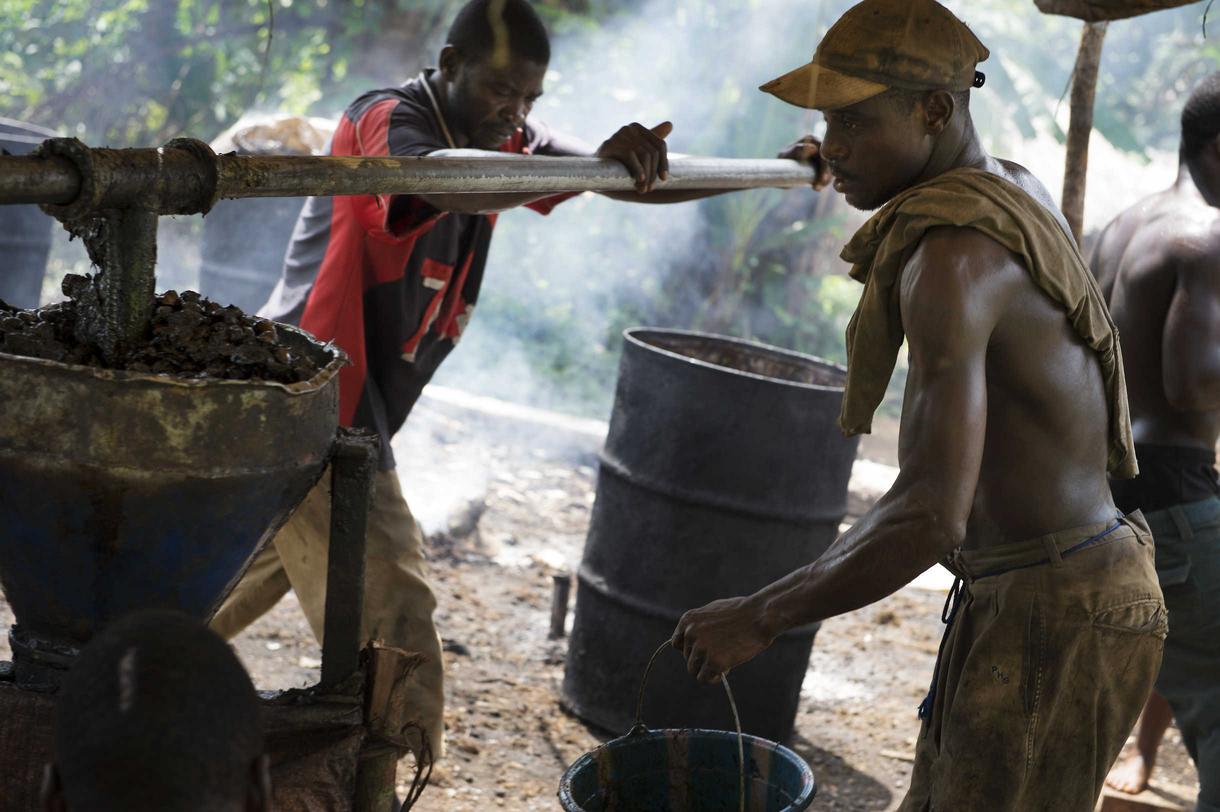Liberian farmers in the shadow of an oil palm plantation contemplate moving—against their will.
Just behind Emily Duo’s house are a group of men roasting the fruit of oil palms in large metal bins over a fire. They scoop out the fruits, steaming despite the 100-degree temperature on this cloudless day, and add them to a mill. Several other men turn the mill, walking in circles pushing long metal handles, as the crude palm oil gushes out of a spout at the base.
Under the shade of her front porch, Duo arranges a tray of smoked fish she has for sale. She lives in a village called Samboard, a collection of about 20 mud houses, some with thatch roofs, others metal, on the edge of a forest, and an oil palm plantation. Most here are farmers, many also collect oil palm fruit and sell crude palm oil.
“The best thing about Samboard is that I can make a business,” Duo says. She travels to the nearby town of Greenville, the main city of Sinoe County here in southern Liberia, where she buys fish, bread, and other foodstuffs she can sell. “When people get palm and sell it, they buy from me,” she say. “It’s good.”

Demand for palm oil is also re-awakening a nearby oil palm plantation, long dormant during Liberia’s civil wars, but now restarting operations and planning to expand, according to Duo’s fellow villagers. And as production picks up, part of Liberia’s effort to export more palm oil, local farmers will be affected.
An emerging export crop
Daniel Krakue, who works for a Liberian organization called Social Entrepreneurs for Sustainable Development (SESDev), says that although Liberia now produces less than five percent of global palm oil, the country is devoting more and more forest land to oil palm plantations and the small-scale farmers standing in the way are vulnerable to loss of land and other more longer term problems related to the destruction of the forest. “Clearing forests and planting palms is causing serious problems for the locals trying to carry out their farming activities,” he says, standing next to a dense forest, adjacent to a recently cleared area, as heavy equipment rumbles past. He says farmers in forested areas across Liberia are at risk of losing their farmland without their consent and no compensation, a violation of their basic rights.
Turning forests into palm oil plantations also releases greenhouse gases into the atmosphere. This is a significant contributor to climate change. In recent years, shifting rainfall patterns in Liberia is making farming an unpredictable business. Oxfam recently released a report calling on the companies that buy palm oil to address the deforestation and other environmentally destructive practices of their suppliers, and play a more active role in cutting greenhouse gas emissions.
One young man in the village joins the group talking with Krakue. He sits with a young girl on his lap, listening to his neighbors. He has only a brief contribution to the discussion: “We have a right to look for a way to earn a living,” is all he says.
Climate change could be the single biggest threat to winning the fight against hunger. Yet some food companies are actually making the problem worse. Your power as a consumer has persuaded General Mills to take a bold stand for climate action. Now we need to call on Kellogg, one of General Mills’ main competitors in the industry, to make similar commitments to address climate change.
